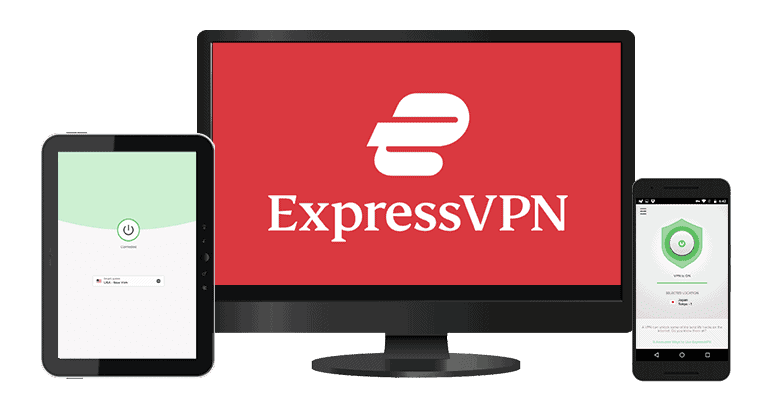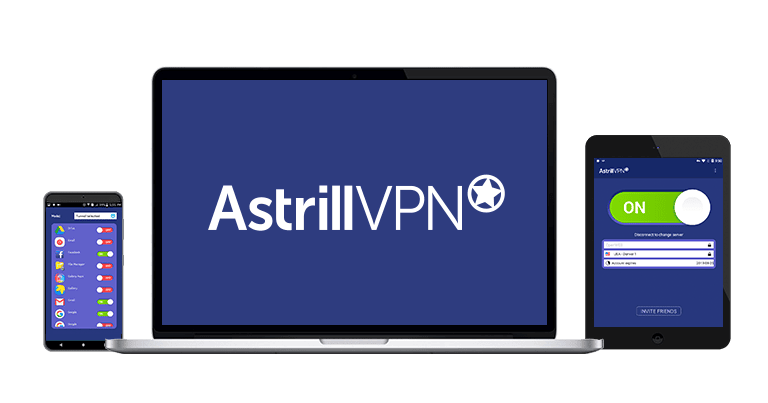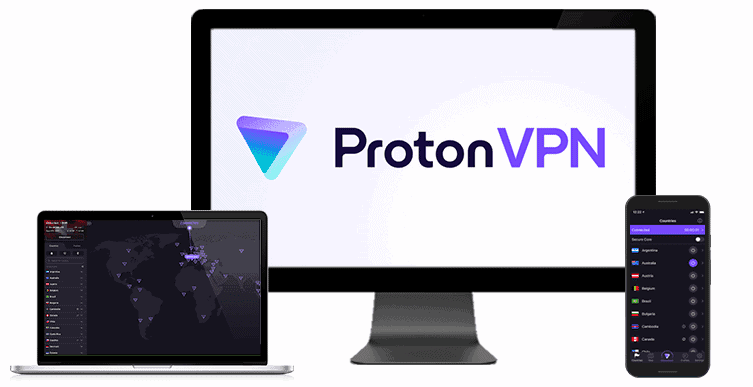
Updated on: January 6, 2025
Short on time? Here’s the best VPN for Russia in 2025:
- 🥇 ExpressVPN (#1 VPN in 2025) : It works in Russia (as confirmed by our tester in Russia), has high-level security, maintains blazing-fast speeds, can access 100+ streaming sites and all popular social media sites at all times, and comes with a 30-day money-back guarantee. Accepted payment methods include YooMoney (Yandex), WebMoney, and Bitcoin.
The best VPNs for Russia hide your VPN use and online activities from your Russian ISP (Internet Service Provider) and the government. They also have advanced security features and maintain fast speeds across all servers.
Most VPNs don’t work in Russia, as the country blocks them. However, I found a few great VPNs for Russia with the help of my colleague in Russia. My favorite is ExpressVPN because it’s ultra-secure and has the fastest speeds. Editors' Note: ExpressVPN and this site are in the same ownership group.
Quick Summary of the Best VPNs for Safely Browsing the Internet in Russia in 2025
🥇1. ExpressVPN — Best VPN for Russia in 2025
ExpressVPN is the best VPN for Russia. It offers obfuscated servers, which are specifically designed to make your VPN traffic look more like regular traffic, so Roskomnadzor won’t know you’re using a VPN or see what you’re doing online. My colleague in Russia tested ExpressVPN’s availability in the country and said he was able to download and install ExpressVPN to his PC without any issues.
The VPN is the best one on the market for streaming. It accesses 100+ streaming services from Russia, such as Netflix and Amazon Prime. In addition, you won’t have trouble visiting news sites like BBC News DW. Apps like X and YouTube in Russia work without any issues as well.
When it comes to speeds, ExpressVPN is difficult to beat. Even though all servers include obfuscation, which typically slows down your connection speed, my colleague in Russia said every website he visited while connected to ExpressVPN’s servers loaded right away. HD videos also began immediately.
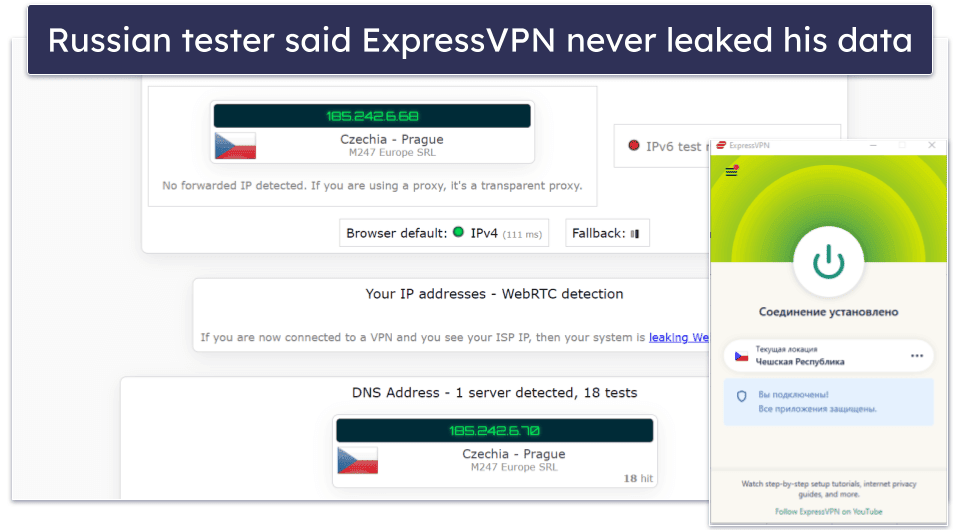
- RAM-only servers. All of the data is stored on RAM instead of the hard drive, and the data is erased each time the server is rebooted. So, none of your data is available.
- An audited no-logs policy. ExpressVPN’s no-logs policy has been independently confirmed multiple times, guaranteeing that no user activity is tracked or stored.
- Full leak protection. Prevents all WebRTC, DNS, and IPv6 leaks, which is crucial for protecting sensitive data and identities from exposure in surveillance-heavy environments like Russia.
If you’re worried about your security while browsing in Russia, ExpressVPN includes Threat Manager, which blocks trackers, preventing the Russian government from spying on you through cookies or scripts. It also protects you from dangerous websites trying to steal your data.
ExpressVPN starts at $4.99 / month, and while it isn’t the cheapest VPN available, it’s certainly the best value (and it’s ranked #1 on our list of the best VPNs). Unlike some VPN providers, all ExpressVPN plans offer the same features, and each plan comes with a 30-day money-back guarantee. ExpressVPN also accepts multiple payment methods, including Bitcoin, YooMoney (Yandex), WebMoney, and others. Qiwi Wallet is no longer available, but all other payment methods work (as confirmed by my colleague in Russia).
You may need a Russian-sanction VPN, like Kaspersky’s free VPN, to access the ExpressVPN app the first time you use it. VPNs like Kaspersky VPN are approved by the government because they comply with Russia’s censorship and data requirements.
Bottom Line:
ExpressVPN is the best VPN for Russia in 2025. It’s fast, secure, can access 100+ streaming sites, and it has great obfuscation. ExpressVPN also includes RAM-only servers, a strict no-logs policy, and extra security tools to ensure your online privacy in Russia. It accepts multiple forms of payment, and all of its plans are covered by a risk-free 30-day money-back guarantee.
Read our full ExpressVPN review
🥈2. Astrill VPN — Secure VPN With Good Speeds in Russia
Astrill VPN secures all of your online activities while in Russia thanks to its Stealth VPN obfuscation protocol that allows the VPN to work in censorship-heavy countries. You can even get a Russian IP address, so all of your traffic is encrypted when you visit Russian sites.
It protects your privacy in Russia with full leak protection against WebRTC, DNS, and IPv6 leaks. However, it’s a shame that its no-logs policy hasn’t been independently audited like ExpressVPN’s — this would make it easier to trust the VPN doesn’t store any user data.
I like its multi-hop (or double VPN) feature, which routes your data through two servers instead of one, adding an extra layer of encryption. This makes it significantly harder for entities like Roskomnadzor to monitor or trace online activity — the feature is only available to VIP users and costs extra, though.

My Russian colleague tested and confirmed the VPN works in Russia and said his speeds were pretty good — all sites he visited loaded in about 2–3 seconds, which isn’t as fast as ExpressVPN, but it’s still pretty fast.
The app accesses news sites like BBC News from Russia, and it works with several Netflix and Max libraries. It also maintains stable connections to social media and messaging apps, such as Signal, Telegram, and Instagram.
Astrill VPN’s plans start at $12.50 / month, but there’s no money-back guarantee — only a 7-day free trial. My colleague in Russia confirmed that he could only pay for an Astrill VPN subscription with UnionPay or cryptocurrency. If you prefer using other popular money transfer services in Russia, I suggest checking out ExpressVPN.
Bottom Line:
Astrill VPN is a great pick for securing your online activities in Russia, plus it comes with decent speeds. It has advanced security features like full leak protection, comes with a multi-hop option, and offers decent obfuscation. Astrill VPN offers a 7-day free trial to test it risk-free in Russia.
Read our full Astrill VPN review
🥉3. Proton VPN — Privacy-Friendly VPN With a Great Free Plan
Proton VPN is great for protecting your online privacy in Russia. It has Secure Core Servers that route your connection through 2 servers — 1 regular and 1 extra hyper-secure server in an ultra-secure location. It also has an audited no-logs policy and an advanced security feature called full-disk encryption, which encrypts all data on the server. This way, if the server is compromised, all data on it is unreadable.
Proton VPN works well in Russia. My Russian colleague was able to visit Proton VPN’s site, download the VPN app, and connect to a VPN server. Like Astrill VPN, you can use Proton VPN to get a Russian IP address and visit Russian-only sites securely.
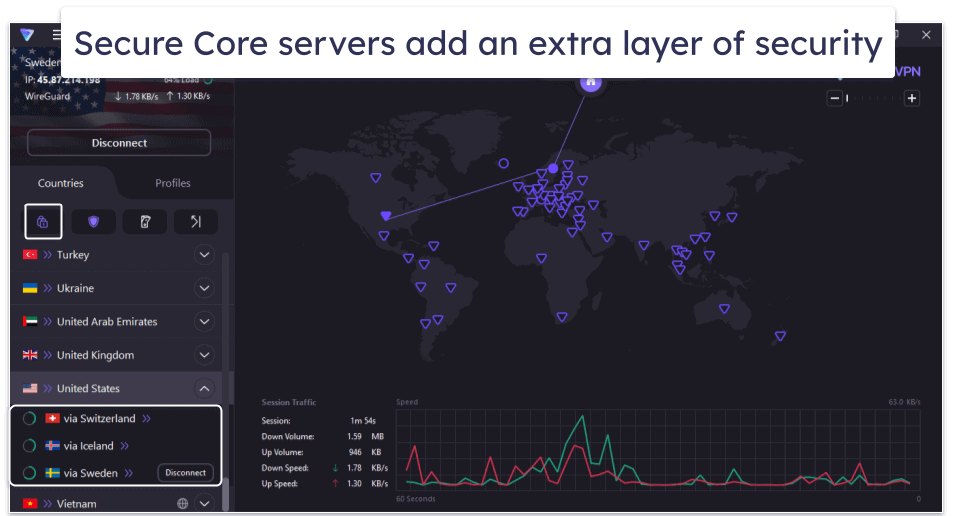
Its speeds aren’t as fast as ExpressVPN, but it’s a great pick for general browsing and streaming. My colleague in Russia said sites loaded in 2–3 seconds and videos started after minor buffering. Proton VPN works with top streaming sites like Netflix and Amazon Prime and accesses social media apps like Instagram.
If you’re only in the market for a free plan, Proton VPN offers the best free one for Russia. The free plan only includes access to servers in 5 countries (USA, Romania, Poland, Japan, and the Netherlands) and just 1 device, but it works in Russia (as confirmed by my Russian colleague) and also provides unlimited VPN data — most free VPNs significantly limit the data allowance.
Proton VPN’s paid version starts at $3.59 / month and includes access to servers in 112 countries, an excellent ad blocker, 10 simultaneous connections, and a prorated 30-day money-back guarantee for all plans. The only available payment method in Russia is UnionPay, so I recommend considering ExpressVPN for more payment options.
Bottom Line:
Proton VPN has advanced security features that ensure your online activities remain private in Russia. It works pretty well in Russia, even on the free version. Proton VPN comes with a prorated 30-day money-back guarantee.
Read our full Proton VPN Review
Quick Comparison Table
Editors' Note: ExpressVPN and this site are in the same ownership group.
Testing Methodology: Comparison & Ranking Criteria
I followed our rigorous testing methodology to make sure I only recommend VPNs that work in Russia and meet our strict quality standards. My Russian colleague and I looked at and tested each VPN’s security and privacy features, speed, and overall performance. Here’s how I picked and ranked each VPN on this list:
- I tested each VPN’s availability in Russia. All of the VPNs I recommend can be downloaded in Russia, as confirmed by my Russian colleague.

- I checked for obfuscation. Every VPN on my list includes obfuscation technology that hides your VPN use from the Russian government and can bypass restrictions in heavily censored regions like Russia.
- I verified that servers could access global content. Each VPN on my list accesses platforms like Netflix, BBC News, and YouTube.
- I checked for strong security features. Every VPN on this list comes with industry-standard protections like 256-bit AES encryption, a kill switch, and leak protection for DNS, IPv6, and WebRTC traffic.
- I evaluated connection speeds across global and nearby servers. VPNs can slow down your internet, especially in regions with limited infrastructure or overcrowded servers. The VPNs on my list offer great speeds in Russia. I found that ExpressVPN delivered the fastest speeds in my tests, even on obfuscated servers, making it ideal for browsing, streaming, and gaming in Russia.

- I assessed ease of use on mobile and desktop apps. All of the VPNs I recommend have user-friendly interfaces, with apps that are simple to install and configure. Astrill VPN, for example, offers customizable desktop clients that advanced users will appreciate.
Why You Should Use a VPN for Russia in 2025
Russia blocks access to the internet, including news, social media, and messaging sites and apps. A VPN allows you to bypass these restrictions and use a free and open internet. So, here’s why you should use a safe and private VPN in Russia:
Regain Freedom of Speech
A VPN empowers you to voice your opinions without fear. With strict regulations in place, it’s understandably daunting to express dissenting views online in Russia. However, by masking your IP address and encrypting all of your online traffic, a VPN allows you to communicate openly and anonymously. No longer do you need to worry about surveillance or repercussions for expressing your thoughts and beliefs.
Get Public Wi-Fi Protection
Public Wi-Fi spots in cafes and airports are prime hunting grounds for hackers — and in Russia, this could include government security services, which try to infiltrate your devices, steal your data, or monitor your online activities. By creating a secure, encrypted tunnel for your data, a VPN protects you from these potential cyber threats.
Download Torrents Anonymously
A VPN hides your real IP address, making it nearly impossible for anyone to track your P2P activities back to you, and it also encrypts your traffic, which makes it unreadable, so nobody, not even your Russian ISP, will be able to see what P2P files you’re downloading or sharing.
Stream Safely & Buffer-Free
Top VPNs can access streaming services like Netflix, Amazon Prime, and Disney+ from Russia. Since they encrypt your traffic, all streaming activities remain safe and anonymous and hidden from the Russian ISP and the government in the country.
How to use a VPN in Russia
The process of using a VPN in Russia follows pretty much the same steps as using any other VPN. However, if you want to use a VPN that gives you access to the free and open web, there are some extra steps you’ll need to take.
1. Visit the VPN provider’s website. Go to your preferred VPN’s provider official website to download the VPN app. If that’s ExpressVPN, visit www.expressvpn.com. My Russian colleague tested it multiple times and was able to access the site 100% of the time. 
2. Download the VPN app. Find the option to download the VPN to your device. On ExpressVPN’s website, select the Download VPN option in the menu at the top. Then, click on the app you want to download. 
3. Open the downloaded file (e.g., expressvpn_windows_12.61.0.4_release.exe) from your downloads folder. Then, install the VPN app.
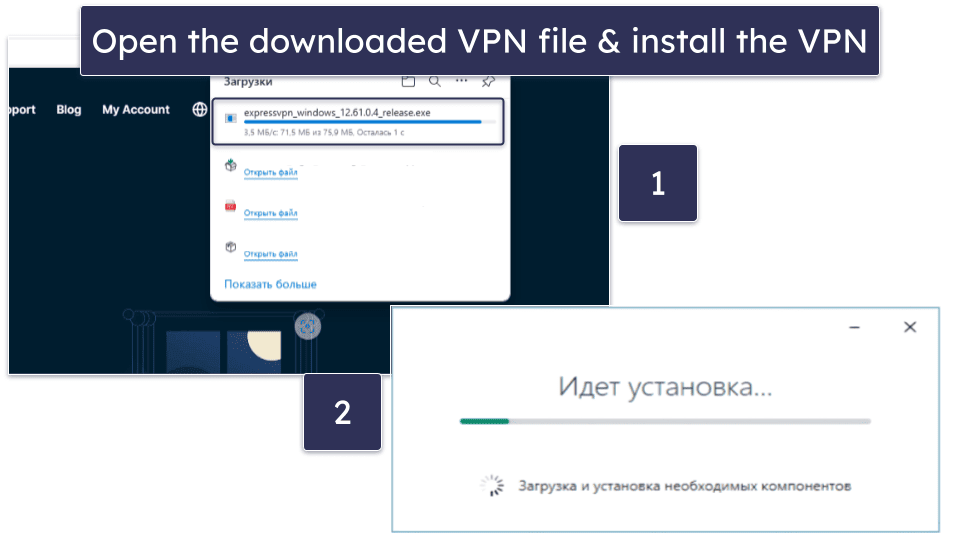
4. Restart your PC to complete the installation. After restarting, the VPN app usually launches automatically. You’ll see this window pop-up, asking you to either log into your account or purchase a subscription. If you don’t already have a subscription, click the Buy subscription option (“купить подписку” in Russian).
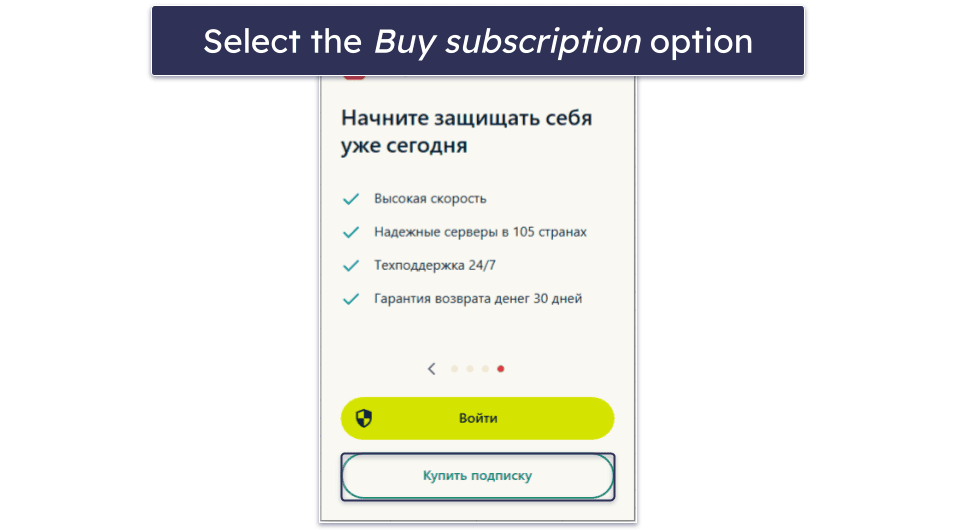
5. Go to ExpressVPN’s website. If you’ve clicked on the Buy subscription option in the ExpressVPN pop-up screen, it’ll automatically take you there. On the site, click Get ExpressVPN or Get Started. 
6. Choose your plan. Then, enter your email address, and select the available payment method. My Russian colleague paid for the subscription with crypto. 
7. Create a secure password for your VPN account. ExpressVPN generates a safe password for you, but you can create your own if that’s what you prefer.
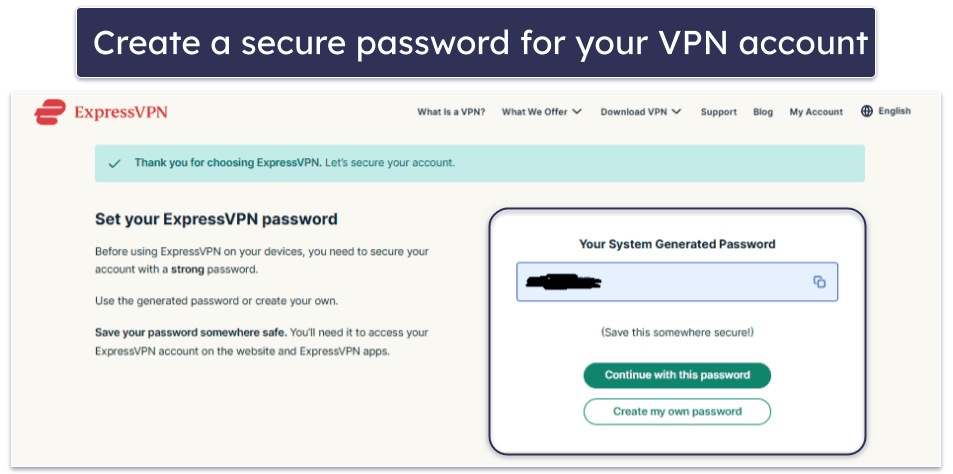
8. Copy the activation code to your clipboard. Go back to the ExpressVPN app and select Log in. Then, paste the activation code into the appropriate field and click Continue (or Продолжить in Russian).

NOTE: When you click Continue in the ExpressVPN app, you may receive an error message, telling you to check your internet connection. This is because ExpressVPN isn’t a Russia-sanctioned VPN, as it doesn’t comply with Russia’s demands to censor and share data. If this happens, click OK and proceed to the next step.
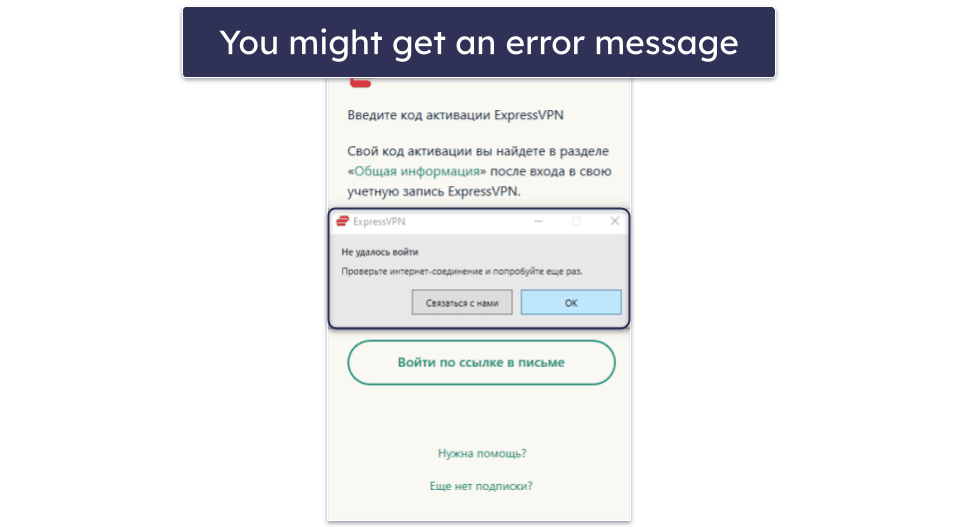
9. Download a helper VPN. If your Russian ISP is blocking access to the ExpressVPN app, Install a VPN that’s allowed to operate in Russia to get around the block. I recommend Kaspersky VPN — it’s free and it’s been sanctioned by the government, so it works in Russia. Please keep in mind that with Kaspersky’s VPN, you’ll only be able to access sites that the Russian government has allowed.
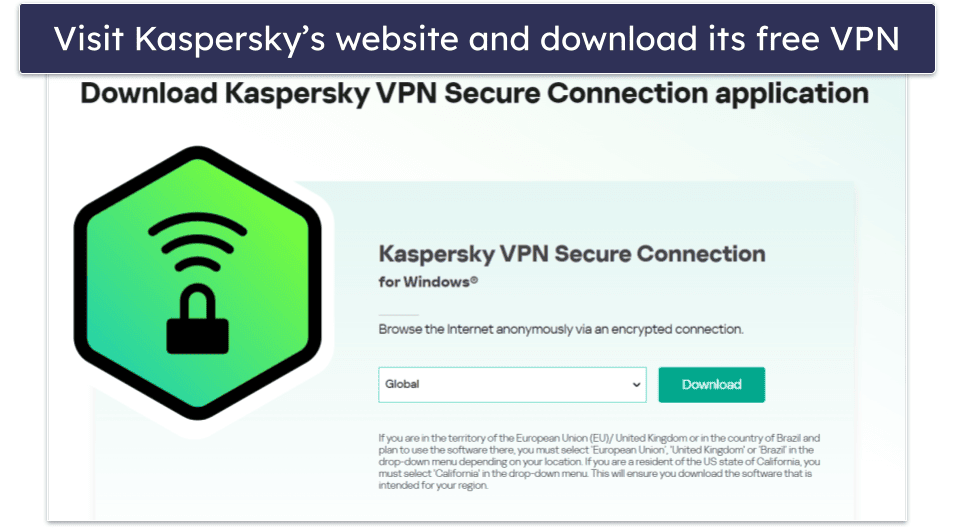
10. Connect the helper VPN to a server outside of Russia. Wait for the VPN to establish a connection to the server.
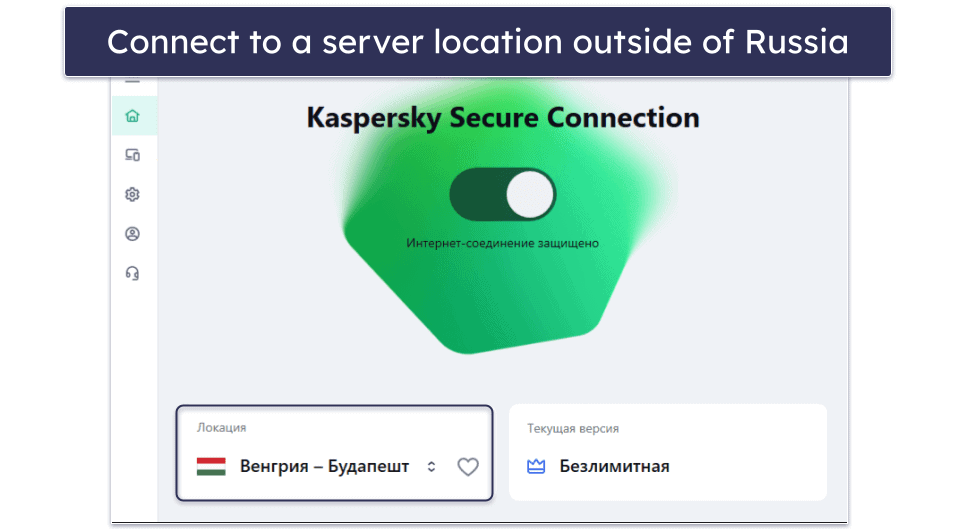
IMPORTANT: Should you encounter an error message and have to use another VPN to gain access to the ExpressVPN app, you’ll only have to use this helper VPN the first time you use the ExpressVPN app, as confirmed by my colleague in Russia.
11. Launch your primary VPN’s app again. You should now be able to open the ExpressVPN app and access its main menu. From there, you can connect to the recommended location or manually pick a server location to connect to. That’s it! You can now securely browse the web from Russia.
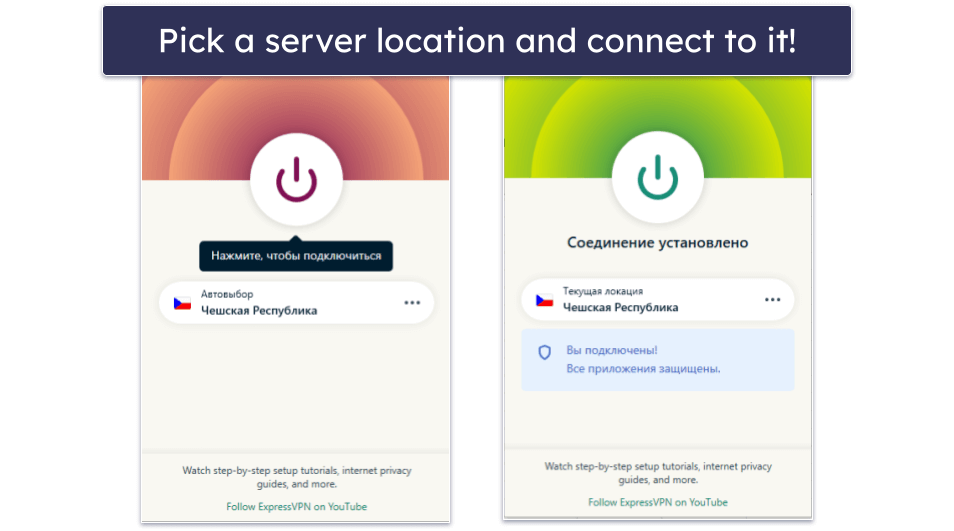
Editors' Note: ExpressVPN and this site are in the same ownership group.
Top Brands That Didn’t Make the Cut
- Private Internet Access. Private Internet Access is one of the fastest and most secure VPNs on the market. It works really well in restrictive countries and its apps are very user-friendly. However, my Russian colleague couldn’t access its official website from Russia.
- CyberGhost VPN. CyberGhost is a great VPN for streaming, gaming, and torrenting, but it doesn’t offer obfuscation, and my colleague in Russia couldn’t visit the VPN’s website from within Russia.
- NordVPN. NordVPN is one of our top-rated VPNs, it has excellent streaming support, includes top-notch security features, and maintains very fast speeds, but it doesn’t work in restrictive countries like Russia.
- Surfshark. Surfshark is secure, provides fast speeds, has a large server network, and offers very cheap plans. However, its reps confirmed it doesn’t work in Russia.
- IPVanish. IPVanish has good speeds, strong security features, and good P2P support, but it doesn’t work in restrictive countries like Russia.
Frequently Asked Questions
Can I browse restricted social media sites using a VPN?
Yes, you can visit restricted websites using a VPN. However, it may be against the rules of your home country or the policies of the website to browse the site via a VPN. All of the VPNs on my list work in Russia without interruption, but please note we don’t recommend using a VPN to break Russian law.
What is Russia’s policy on VPN usage?
Russia’s laws state that VPNs must allow federal services to view user activity. The laws also state that VPN providers can’t help Russian-based users access blacklisted sites.
These laws have seemingly been ineffective, as it’s almost impossible for the Russian government to track and block VPN usage. There are some network restrictions that block VPN connections, but they don’t always work, and it’s unlikely that a VPN user would face prosecution for using a VPN.
However, that doesn’t mean VPNs are 100% legal in Russia or that you can commit illegal activities while using a VPN in Russia. I strongly recommend following local laws when using a VPN and we at SafetyDetetives don’t endorse breaking any rules and Russian laws.
Can I use a free VPN in Russia?
Yes and no. There are some good free VPNs available, but most free VPNs don’t work in Russia, have very limited data allowances, and sometimes have sketchy security policies.
I think using a paid VPN (like ExpressVPN) is the best option. Most paid VPNs consistently work in countries like Russia and they also provide unlimited data, strong security and privacy, and fast speeds.
Which is the best VPN for Russia?
The best VPN for Russia is ExpressVPN. It works in Russia 100% of the time. It’s also the fastest VPN on the market and has high-end privacy and security features to keep you safe and anonymous online. All of its plans are backed by a 30-day money-back guarantee, so you can test it out risk-free.
